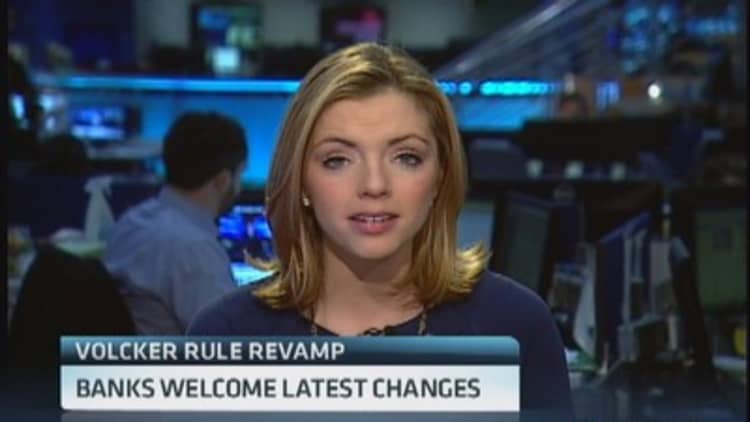
Regulatory agencies have agreed to change a key provision in the Volcker Rule that smaller banks had argued would cause a major hit to their bottom line.
The rule's central goal was to keep banks from boosting their bottom line with proprietary trades—done for the banks' own profit—but the American Bankers Association argued smaller banks had already been given a pass by regulators on this issue in other capital constraints. The rule was part of the larger Dodd-Frank provisions that came into being as regulators wrestled with how to prevent another financial crisis with banks that were too big to fail.
Much of the 880 pages of the highly anticipated Volcker Rule had been thoroughly debated, commented on, and edited before the publication of the suggested final edition on Dec. 10. But a brand-new provision prohibiting banks from keeping investments in collateralized debt obligations backed by hybrid securities called trust preferreds, or TRuPs, immediately ignited a controversy.
Within a week, Salt Lake City-based Zions Bank said it would take a $387 million after-tax charge as it unloaded relevant assets to comply with the rule.
Two weeks in, the industry sued. The American Bankers Association, filing a lawsuit on Christmas Eve, claimed regulators were endangering more than 300 community banks who rely on these esoteric—yet relatively safe—instruments to earn money.
(Read more: This part of Wells Fargo's business is taking off)
On Tuesday, the five regulators comprising the Volcker brainpower— the Federal Reserve, the Federal Deposit Insurance Corp., the Office of the Comptroller of the Currency, the Commodities Futures Trading Commission, and the Securities & Exchange Commission—amended the rule to allow banks to retain certain types of TruPS-backed CDOs. The conditions: The securities must have been issued before May 19, 2010 (when Dodd-Frank passed), and the bank in question must have acquired the interest in the securities before Volcker was unveiled in December.
Kenneth Bentsen, CEO of the Securities Industry Financial Markets Association, testified at a House hearing on Volcker that the same treatment should be granted to CLOs, which are cousins to the CDOs but composed of loans and not bonds. Bentsen warned the CLO market could be disrupted, and the cost of credit would rise for many "Main Street businesses that benefit from the market."
(Read more: Interest rates don'tmatter? Fed paper says so)
The CDO amendment, meanwhile, caused a collective sigh of relief at many banks, especially small and mid-sized institutions.
A spokesperson for Zions said the bank is reviewing the new guidance before any potential change in strategy. At the House hearing, Charles Funk, CEO of MidWestOne Financial Group, thanked regulators for sparing his bank an immediate $1.05 million write-down and creating a "sellers-only" market in CDOs.
"For many smaller institutions the losses anticipated (would be) devastating, resulting in a hit to capital that will inhibit them from lending to their community," said Funk, testifying on behalf of the bankers association.
Statements on the ABA's website said its first glance of the new language indicates banks will be broadly exempt from the prior rules and commended regulators' actions, while still leaving litigation on the table. "We are, however, deferring a decision on dismissal of the litigation to allow time to consult with our membership and finalize our analysis of the impact and implications of the interim final rule," the ABA said.
—By CNBC's Kayla Tausche. Follow her on Twitter @kaylatausche.

